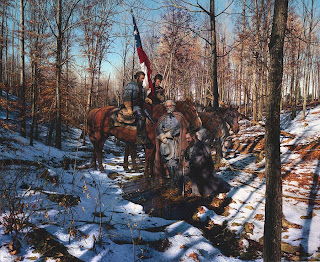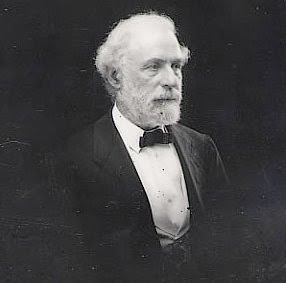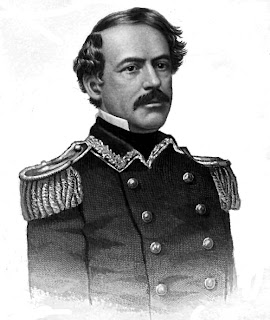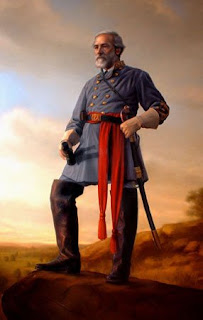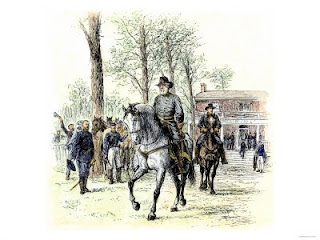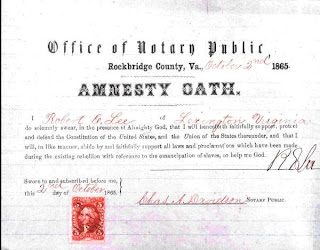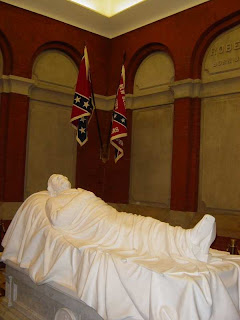
Today is Thanksgiving, a national holiday, yet many people have no idea of the history of the holiday. Those of you living around Coltons Point should know this history as it began around the colonial days. Coltons Point is the oldest continuously lived in town in the American colonies and was the third landing point for pilgrims from Europe, arriving here in 1634. Exactly 155 years after the colonists landed here, the Thanksgiving tradition began.
Originally called St. Clement's Island Manor, after the island just offshore where the pilgrims landed, it was home to two wives of President George Washington's great, great grandfather. One of the Gerard daughters, whose father was most responsible for the settlement, married Washington's great, great grandfather who lived across the Potomac River within eyesight of Coltons Point. When she died early into the marriage, her younger single sister took her place under the tradition of British Colonial law.
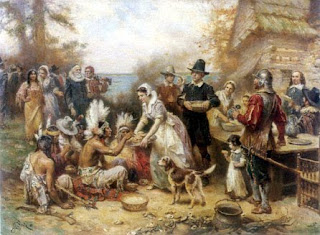
Now not to overlook the Spaniards, they did hold some form of Thanksgiving celebrations in Saint Augustine in 1565, then San Elceario (near today's El Paso) but neither was part of the original thirteen colonies. In 1619 Virginia colonists held such a feast and in 1621 the Plymouth, Massachusetts colonists held such a feast but this was before the founding of the nation and they were not annual traditions.
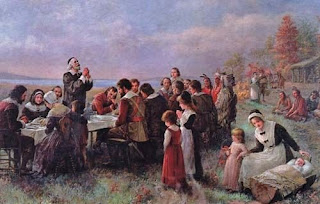
After the founding of the United States the first holiday was declared by President George Washington, a religious feast to thank the "providence of Almighty God" for his help. Still, it was not designated a national holiday but states were encouraged to participate.

Of course George was born directly across the river from Coltons Point and when younger he walked this area as a surveyor.

George Washington
As President, on October 3, 1789, George Washington made the following proclamation and created the first Thanksgiving Day designated by the national government of the United States of America:
Whereas it is the duty of all Nations to acknowledge the providence of Almighty God, to obey his will, to be grateful for his benefits, and humbly to implore his protection and favor, and whereas both Houses of Congress have by their joint Committee requested me "to recommend to the People of the United States a day of public thanksgiving and prayer to be observed by acknowledging with grateful hearts the many signal favors of Almighty God especially by affording them an opportunity peaceably to establish a form of government for their safety and happiness.
Now therefore I do recommend and assign Thursday the 26th day of November next to be devoted by the People of these States to the service of that great and glorious Being, who is the beneficent Author of all the good that was, that is, or that will be. That we may then all unite in rendering unto him our sincere and humble thanks, for his kind care and protection of the People of this Country previous to their becoming a Nation, for the signal and manifold mercies, and the favorable interpositions of his providence, which we experienced in the course and conclusion of the late war, for the great degree of tranquility, union, and plenty, which we have since enjoyed, for the peaceable and rational manner, in which we have been enabled to establish constitutions of government for our safety and happiness, and particularly the national One now lately instituted, for the civil and religious liberty with which we are blessed; and the means we have of acquiring and diffusing useful knowledge; and in general for all the great and various favors which he hath been pleased to confer upon us.
And also that we may then unite in most humbly offering our prayers and supplications to the great Lord and Ruler of Nations and beseech him to pardon our national and other transgressions, to enable us all, whether in public or private stations, to perform our several and relative duties properly and punctually, to render our national government a blessing to all the people, by constantly being a Government of wise, just, and constitutional laws, discreetly and faithfully executed and obeyed, to protect and guide all Sovereigns and Nations (especially such as have shown kindness unto us) and to bless them with good government, peace, and concord. To promote the knowledge and practice of true religion and virtue, and the encrease of science among them and Us, and generally to grant unto all Mankind such a degree of temporal prosperity as he alone knows to be best.
Given under my hand at the City of New York the third day of October in the year of our Lord 1789.

The national holiday came during the darkest hours of the Civil War when Lincoln was president. The year was 1863, and it was the bloodiest days of the Civil War. It followed the battles of Vicksburg and Gettysburg and Lincoln's trip to Gettysburg to honor the most soldiers killed in one battle in our history, Lincoln, heartbroken by what he had seen at Gettysburg, may have used Thanksgiving as a time to give the people to reflect and hope. He was not a publicly religious man, but he used his Thanksgiving proclamation to find humility and gratitude, and to remember how richly blessed we as a nation really were despite everything. His proclamation was one of the first times he used strong religious overtones in his public speech.

Abraham Lincoln
In the middle of the American Civil War, President Abraham Lincoln, prompted by a series of editorials written by Sarah Josepha Hale, proclaimed a national Thanksgiving Day, to be celebrated on the final Thursday in November 1863:
The year that is drawing towards its close, has been filled with the blessings of fruitful fields and healthful skies. To these bounties, which are so constantly enjoyed that we are prone to forget the source from which they come, others have been added, which are of so extraordinary a nature, that they cannot fail to penetrate and soften even the heart which is habitually insensible to the ever watchful providence of Almighty God. In the midst of a civil war of unequalled magnitude and severity, which has sometimes seemed to foreign States to invite and to provoke their aggression, peace has been preserved with all nations, order has been maintained, the laws have been respected and obeyed, and harmony has prevailed everywhere except in the theatre of military conflict; while that theatre has been greatly contracted by the advancing armies and navies of the Union. Needful diversions of wealth and of strength from the fields of peaceful industry to the national defence, have not arrested the plough, the shuttle, or the ship; the axe had enlarged the borders of our settlements, and the mines, as well of iron and coal as of the precious metals, have yielded even more abundantly than heretofore. Population has steadily increased, notwithstanding the waste that has been made in the camp, the siege and the battle-field; and the country, rejoicing in the consciousness of augmented strength and vigor, is permitted to expect continuance of years, with large increase of freedom.
No human counsel hath devised nor hath any mortal hand worked out these great things. They are the gracious gifts of the Most High God, who, while dealing with us in anger for our sins, hath nevertheless remembered mercy.
It has seemed to me fit and proper that they should be solemnly, reverently and gratefully acknowledged as with one heart and voice by the whole American people. I do therefore invite my fellow citizens in every part of the United States, and also those who are at sea and those who are sojourning in foreign lands, to set apart and observe the last Thursday of November next, as a day of Thanksgiving and Praise to our beneficent Father who dwelleth in the Heavens. And I recommend to them that while offering up the ascriptions justly due to Him for such singular deliverances and blessings, they do also, with humble penitence for our national perverseness and disobedience, commend to his tender care all those who have become widows, orphans, mourners or sufferers in the lamentable civil strife in which we are unavoidably engaged, and fervently implore the interposition of the Almighty Hand to heal the wounds of the nation and to restore it as soon as may be consistent with the Divine purposes to the full enjoyment of peace, harmony, tranquility and Union.
In testimony whereof, I have hereunto set my hand, and caused the seal of the United States to be affixed.
Done at the city of Washington, this third day of October, in the year of our Lord one thousand eight hundred and sixty three, and of the independence of the United States the eighty-eighth."
Proclamation of President Abraham Lincoln, October 3, 1863.
Since 1863, Thanksgiving has been observed annually in the United States.

I hope you all join me in Thanksgiving, honoring the Almighty God as Washington and Lincoln told us, and honoring our sons and daughters around the world defending our right to be free.
Now, for your delight, here are all the presidents since Roosevelt with their Thanksgiving turkey.
 |
| FDR |
 |
| Truman |
 |
| Ike |
 |
| JFK |
 |
| Johnson |
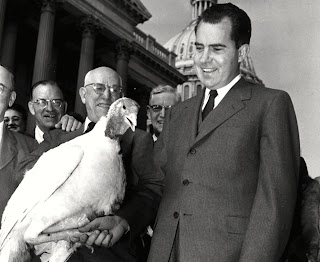 |
| Nixon |
 |
| Ford |
 |
| Rosalynn filled in for Jimmy |
 |
| He was busy hunting turkeys |
 |
| Is he the turkey? |
 |
| Reagan first to officially pardon turkey |
 |
| Bush Sr |
 |
| Clinton |
 |
| Bush Jr |
 |
| Obama |
 |
| Trump |
.


